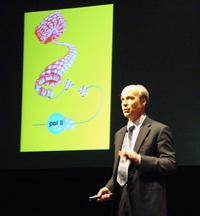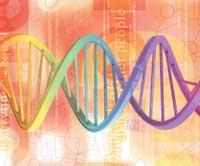Like his father, his son is also a Nobel Prize winner

It seems that in the house of the Kornberg there is a great tradition in the research of Genetics. My father, Arthur, received the Nobel Prize in Physiology or Medicine in 1959 (together with Severo Ocho) for investigating how DNA copies itself; this year his son, Roger, will receive the Nobel Prize in Chemistry for a similar research, for studying how DNA transcription occurs in eukaryotes.
For the work of the two generations to refer to the same subject, this should be very important and if DNA is important, since it keeps the information of life. In this molecule is defined the way to make all the proteins that the cell should synthesize. The cells of all living beings read the information of DNA, but not all do so in the same way.
In the simplest living beings, such as bacteria, DNA is free within the cell. But in complex living beings, DNA is enclosed in a capsule called nucleus. And he does not leave there. Therefore, the cell makes a copy of the information within the nucleus and that copy leaves the cytoplasm of the cell to do everything necessary. It's like having a specialized library inside the cell, you can't get books, but photocopies in the library itself.
Roger Kornberg has investigated how the ‘photocopy’ of DNA is performed in these eukaryotic cells. The copier is a protein: RNA polymerase. Read the DNA and form a molecule like the RNA that contains this information. This is the copy that will leave the kernel and that is why it is called messenger RNA (RNAm).

In fact, the copier molecule, RNA polymerase, was known; it is also used by bacteria, even if differently. French biologists Monod, Lwoff and Jacob investigated how and why they received the Nobel Prize in Physiology or Medicine in 1965.
But the functioning was not the same in eukaryotes. The merit of Roger Kornberg has been to devise a research system of this difference based on yeast cells. It has obtained surprising results, among which detailed photographs of the functioning of the RNA polymerase have been obtained in recent years.
For all this work, this year will be given the Nobel Prize. As they gave their father. All the Kornberg will be proud.
Buletina
Bidali zure helbide elektronikoa eta jaso asteroko buletina zure sarrera-ontzian








